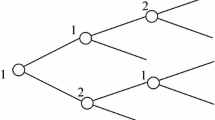Abstract
This paper deals with parallel-planning strategies for the development of a new item. Let us assume that several proposals for developping the new item are available. Usually one is interested to choose the “best” of these proposals with respect to some criterion. But it may happen that the data available at this point of the development process are very inaccurate and uncertain and therefore unreliable. For example a proposal promising low costs and low time to bring the project to the end may turn out to be very expensive after its completion. In such situations a wrong decision may be avoided by pursuing a parallel path approach. Several, say m, of the proposals are pursued to a review-point at which point the best project is selected and brought to completion while the other still remaining approaches are stopped. This is the simplest model of a parallel path-approach; generalization to several review points, however, are possible and done in the literature (see Marschak [3]).
This work was done, when the author was a research worker at “Studiengruppe für Systemforschung”, D 69 Heidelberg 1, Werderstr. 35
Access this chapter
Tax calculation will be finalised at checkout
Purchases are for personal use only
Preview
Unable to display preview. Download preview PDF.
Similar content being viewed by others
References
T.A. Marschak and J.A. Yahav: “The sequential selection of approaches to a task”, Management Science, Vol. 11, No. 9, May 1966, p. 627–647.
T.A. Marschak: “Models, Rules of Thumb, and Development Decisions”, Operations Research in Research and Development Decisions, B.V. Dean, editor, John Wiley, New York, 1962, p. 247–263.
Th. Marschak: “Towards a normative theory of Development” in Th. Marschak et. al. (Ed.) “Strategy for R & D” Econometrics and Operations Research, Vol. V III, Springer Verlag, Berlin-HeidelbergNew York (1967).
R.R. Nelson: “The Economics of Parallel R and D efforts: A Sequential-Decision Analysis”, Rand Research Memorandum Rm-2482, The Rand Corp., Santa Monica, Calif., Nov. 12, 1959.
H. Drygas und H. Paschen: “Parallelplanung bei Forschungs- und Entwicklungsprojekten”, in H. Krauch, H. Paschen (Eds.) “Methoden und Probleme der Forschungs- und Entwicklungsplanung, unter besonderer Berücksichtigung der Prioritätsbestimmung”, Oldenbourg-Verlag, München 1972.
H. Drygas: “Parallel Path Strategy - Theory and Numerical Illustrations”, Diskussionspapier der Studiengruppe für Systemforschung, Januar 1973.
Author information
Authors and Affiliations
Editor information
Editors and Affiliations
Rights and permissions
Copyright information
© 1976 Springer-Verlag Berlin · Heidelberg
About this paper
Cite this paper
Drygas, H. (1976). Parallel Path Strategy Theory and Numerical Illustrations. In: Oettli, W., Ritter, K. (eds) Optimization and Operations Research. Lecture Notes in Economics and Mathematical Systems, vol 117. Springer, Berlin, Heidelberg. https://doi.org/10.1007/978-3-642-46329-7_5
Download citation
DOI: https://doi.org/10.1007/978-3-642-46329-7_5
Publisher Name: Springer, Berlin, Heidelberg
Print ISBN: 978-3-540-07616-2
Online ISBN: 978-3-642-46329-7
eBook Packages: Springer Book Archive




